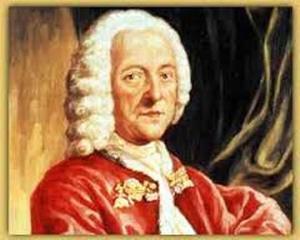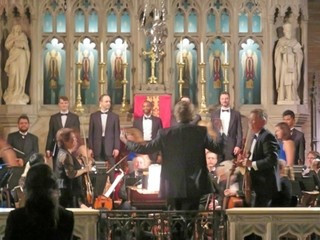|
Back
New York
The Church of Saint Ignatius in Antioch
10/13/2015 -
Georg Philipp Telemann: Der Tag des Gerichts
American Classical Orchestra Chorus: Lucy Fitz Gibbon, Wilson Nichols, Sarah Nelson Craft (Belief), Amanda Sidebottom (Religion), Katherine Wessinger (Archangel), Brian Giebler (Mocker), Alex Guerrero, Jonathan Woody (Disbelief), Lawrence Jones, Donna Breitzer, Jennifer Bates (The Blessed), Helen Karloski (Reason), Elizabeth Merrill, Enrico Lagasca (Devotion), Dominic Inferrera (John), Steven Eddy (Jesus)
American Classical Orchestra, Thomas Crawford (Music Director)

G.P. Telemann
Near the end of Georg Philipp Telemann’s Day of Judgment last night a single minute was as ravishingly beautiful as anything in Baroque literature. Dominic Inferrera, as Saint John, started a lovely aria based on the Agnus Dei with string accompaniment. Halfway through the solo aria, the American Classical Orchestra Chorus entered with a chorale-like descant (“Holy Is Our God”). And a few seconds after that, the entire brass section of the American Classical Orchestra–natural trumpets and horns–filled in this tapestry in the lowest registers, providing, a warm, utterly gorgeous benediction.
The entire 85-minute oratorio has these wondrous moments of utter musical pleasure. And utter surprise. For G. P. Telemann usually has a bad rep in the musical world. Like Vivaldi’s erstwhile reputation as a one-trick pony, Telemann has been saddled with endless “trio sonatas”, an infinite number of “recorder sonatas” and countless “table-music” ephemerae. Their appeal has been to a rarefied very snobbish elite.
Meeting them (even Hong Kong had a Telemann Society), I’ve kept my distance, though some members easily convinced me that he was the most prodigious composer in history. From the age of 10, Telemann composed at least one work each day of his life. And since he died at the age of 86 (the work last night was composed when he was 81), a quick computation shows he must have written twenty-five thousand pieces of music.
Handel, pretty prodigious himself, said that Telemann could write an eight-part motet quicker than he could write a letter, and the autodidact composer himself confessed, “I have always aimed at facility. Music shouldn’t be an effort.”
Add to this his non-scholarly peregrinations. Unlike the cloistered Bach or citified Handel, Telemann was at home in a Polish tavern as a Hamburg cathedral, an Italian opera-house and a Croatian country wedding.
True, Telemann was a great figure, but compared to his friends Handel and Bach, this great “facility” is like Salieri to Mozart: deft, clever, yet lacking the darkness of immortal music.
Still, a rare performance of this oratorio is quite the gift. Like Handel, Telemann was partly the secularist, and Day of Judgment was never meant for the church performance, which we had last night. After all, the amazing libretto, seems in English, like an Oratorio of Manners
Which is why I couldn’t resist listing the full dramatis personae above. Aside from Saint John and Jesus (the latter given a few lines of an aria, and the vengeful personality of a Caliphate Iman), we have the personifications of Disbelief, Mocker, Reason, Belief and Religion. Nor do Disbelief and Mocker get short shrift. For the first of four “contemplations”, they argue their case, deride superstition, ridiculing those who “hear the gloomy speech of delusion and are too stupid to reject it.”
A man after my own 21st Century New York heart.
Only when the real Day of Judgment comes about in the fourth “Contemplation” does Jesus tell these people that they’ll be going to hell to be tormented “forever”.
This leads, of course, to a dissonant groaning Chorus of Vices, but great rejoicing for three blessed soloists, the full Chorus of Believers, ending with trumpets, drums and, presumably, a post-Salvation cocktail party with a garage band, loaves fishes and vintage water from wine.

American Classical Orchestra in St. Ignatius of Antioch Church
(© Samuel A. Dog)
So this is not so much a Bach Passion or even a Handelian Old– or New Testament story. Day of Judgment takes characters out of John Bunyan, and puts them into the guise of a Ben Jonson play.
The result wasn’t a romp. But the American Classical Orchestra period-instrument orchestra and the Baroque-sized 16-voice Choir created a picturesque piece of religious theatricality.
Essentially, though, this was the music of Telemann. Not the inward, orthodox Lutheran cantatas by Bach, but the outward German equivalent of Handel’s roast-beef and Yorkshire pudding oratorios. When the libretto called for “the thundering voices of the storm”, Telemann offered scary shivers in the strings. When the character of Reason spoke about pride sinking “into a mournful grave,” alto Helen Karloski) dipped down to the bottom of her range. When the Chorus of the Blessed called up the Seraphim, the strings played at their highest pitch.
Earthquakes, thunder, lightning, devastation were painted up in surprisingly colorful orchestral writing. And while this never had Bach’s subtlety (he would have given a three note symbolic theme), it was literal fun.
To get the most out of the unfamiliar score, I confess to reading the libretto while listening. The audience in the church studiously respected the music and German words, but perhaps had little idea what the hell it was all about. (Or in the last section, what in heaven it was all about.) I preferred following the story.
Telemann divided Day of Judgment into four short cantatas, translated in the program as “Contemplations”. (That may be an unduly austere translation of Betrachtung; “Viewpoints” would have more emotional truth.) Telemann started with drums, trumpets and chorus (no day of judgment is complete without them) and immediately went onto the skeptics, “Disbelief” and “Mocker” refusing to believe that Jesus was coming to town. For the second section, “Devotion” and “Belief” plead to be saved. Then Jesus (bass Steven Eddy) gave his fierce judgment, and finally everybody who was saved sang, danced and brought back the drums and trumpets.
The American Classical Orchestra under Thomas Crawford were on top of the situation. Yes, the louder portions were blurred in the sanctuary of Saint Ignatius of Antioch Church, but pristine strings are hardly called for. In the more religious passages, Telemann used solos (like the solo oboe in Jesus’ blessing to the believers), or a beautiful cello solo, but mainly it was strings, a splendid brass section giving gravitas and those musical paintings. In other words, when “Devotion” sings, “Trumpets roar! Thunders speak!”, you can believe that trumpeter John Thiessen and timpanist Dan Haskins roared and spoke.
Mr. Crawford cleverly used each of the 16 choristers as the characters of the piece. It would be unfair to mention them individually, for they all gave enthusiastic belief and sonorous sounds accentuated by the church acoustics.
Still, one must mention Enrico Lagasca, as Devotion, singing a dramatic recitative with orchestra, giving a dynamic weather forecast of the Final Day: “loud thunders”, “harmonies of the spheres dissolving”, “clouds whipped by storms”, “sunlight growing pale”. Add to this the three Blesseds, Lawrence Jones, Donna Breitzer, and Jennifer Bates. Compared to the literal Sturm und Drang of the first sections, their music was sweet, more Bach-like. And while hardly as exciting, the arias showed Telemann at his most inspired.
Finally, the American Classical Orchestra Chorus, restricted in size but never volume. Theirs were voices not of adoration but of joy, pure joy. Telemann might never have reached the profundity of Bach in this work, but one can’t always have a Passion. One needs energy, spot-on enunciation, balance and the right kind of zest to make the zealous sentiments viable. If the noble sentiments were secondary to story-telling, so be it. And if one must have a final day of the dead, it’s always more gratifying if filled with life.
Harry Rolnick
|